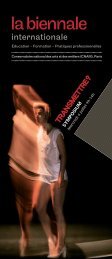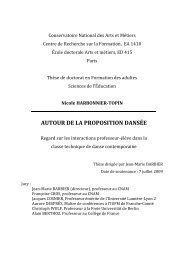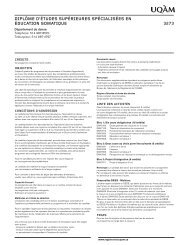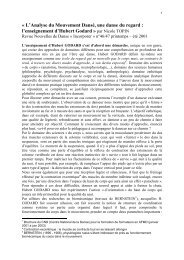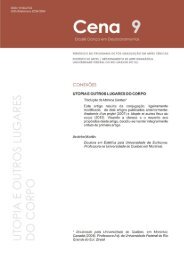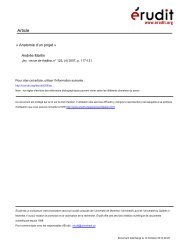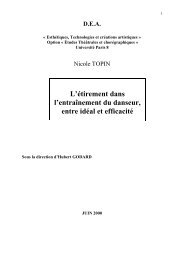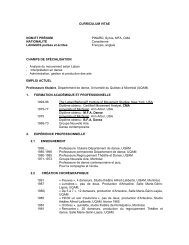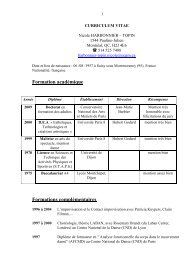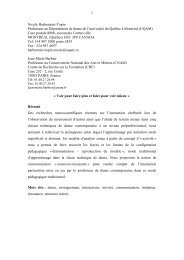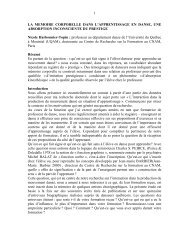Day 2 - Département de danse - UQAM
Day 2 - Département de danse - UQAM
Day 2 - Département de danse - UQAM
You also want an ePaper? Increase the reach of your titles
YUMPU automatically turns print PDFs into web optimized ePapers that Google loves.
<strong>Day</strong> 3: Monday, June 3<br />
9:00-10:30am<br />
Keynote: Helen Gilbert (Royal Holloway, University of London)<br />
George<br />
“Step by Step: Walking, Reconciliation and Indigenous Performances of Sovereignty”<br />
Ma<strong>de</strong> possible by the CFHSS International Keynote Speaker Support Fund. Introduction: Sheila<br />
Rabillard<br />
Helen Gilbert is Professor of Theatre at Royal Holloway, University of London and co-convener of its interdisciplinary<br />
Postcolonial Research Group. Her monographs and co-authored books inclu<strong>de</strong> Performance and Cosmopolitics: Cross-<br />
Cultural Transactions in Australasia (2007), Sightlines: Race, Gen<strong>de</strong>r and Nation in Contemporary Australian Theatre (1998)<br />
and Postcolonial Drama: Theory, Practice, Politics (1996). She has published wi<strong>de</strong>ly in theatre and performance as well as in<br />
postcolonial studies and has recently co-written a book on orangutans, race and the species boundary. Her primary research<br />
is now focused on an interdisciplinary and multinational team-based project examining Indigeneity and Contemporary<br />
Performance, fun<strong>de</strong>d until 2014 by the European Research Council.<br />
10:30am — break (featuring an excerpt from Nelson Gray’s Hear Oceans Roar in the Circular Plaza)<br />
10:45-12:15pm<br />
a) Canadian Performance Genealogies George<br />
Roundtable Organizer: Heather Davis-Fisch (University of the Fraser Valley). Participants: Roberta<br />
Barker (Dalhousie University), Kirsty Johnston (University of British Columbia), Laura Levin (York<br />
University), Marlis Schweitzer (York University), Kim Solga (Queen Mary, University of London).<br />
Genealogies of performance, which Joseph Roach <strong>de</strong>scribes in Cities of the Dead as genealogies that “document—and<br />
suspect—the historical transmission and dissemination of cultural practices through collective representations” (25), provi<strong>de</strong> a<br />
theoretical and methodological framework for positioning theatrical, extra-theatrical, and non-theatrical performances in<br />
conversation with one another and for <strong>de</strong>scribing “the disparities between history as it is discursively transmitted and memory<br />
as it is publicly enacted by the bodies that bear its consequences” (26). Roach’s work on performance genealogies, as well as<br />
Diana Taylor’s formulation of the archive and the repertoire, Alice Rayner’s theorization of substitution and mimesis, and Greg<br />
Dening’s <strong>de</strong>scription of ethnographic history, have helped performance scholars to respond to Walter Benjamin’s call for the<br />
historian to move beyond telling “the sequence of events like the beads of a rosary” (255) and to take his or her own affective<br />
and ethical engagements with the past into account. A genealogical approach to performance history appears to provi<strong>de</strong> new<br />
ways of interpreting the performances of the past and (re)introducing previously overlooked performance practices. However,<br />
it is crucial to consi<strong>de</strong>r how the theories, terminology, and methodologies of this approach operate in Canadian contexts and to<br />
pose questions about the historical, ethical, and social implications of genealogical approaches to performance history. For<br />
example, Roach suggests that this approach provi<strong>de</strong>s scholars with specific ways of addressing intercultural performances of<br />
the past: when consi<strong>de</strong>ring the former settler-colonies that are now Canada, it is essential to interrogate how western mo<strong>de</strong>s<br />
of temporality, which Roach’s concept of vortices of behaviour relies upon, might be in tension with Indigenous un<strong>de</strong>rstandings<br />
of time and space.<br />
b) From Orientalizing Agendas to Indigenous Dramaturgies Bishop<br />
Open Panel Mo<strong>de</strong>rator: Sheila Rabillard (University of Victoria)<br />
“Orientalizing agendas in the Far North: Marie Chouinard’s Les trous du ciel (1991).” Bridget<br />
Cauthery (York University)<br />
In 1991 avant gar<strong>de</strong> Quebeçoise choreographer Marie Chouinard created Les trous du ciel (“holes in the sky”) for her nascent<br />
contemporary dance company. The work features throat singing by a fictitious clan of half-animal, half-human “primitives”<br />
drawn from Chouinard’s imagination and from her research on Canadian Inuit culture. The premise for the piece is taken from<br />
the notion that, for the Inuit, each star is a hole in the sky. Chouinard was inspired by the poetic potential of this i<strong>de</strong>a as well as<br />
the aural possibilities of shared breath and the resulting work for seven dancers met with national and international acclaim.<br />
Stepping asi<strong>de</strong> from the artistic success of the work Chouinard’s Les trous du ciel may be read in terms of its performance of<br />
an infantilized primitivism with overt links to Orientalism.<br />
While Said’s notion of Orientalism (1978) was <strong>de</strong>veloped in relation to <strong>de</strong>pictions and interpretations of the Near and<br />
Middle East application of his theories to post- and neo-colonial interpretations of the Arctic are significant (Bloom 1993;<br />
Brandt 2005; Bravo & Sverker 2002; Davidson 2005; Grace 2001; Hansen & Norberg 2009; Moss 2006; Pratt 1992; Spufford<br />
1996). In relation to the “North” orientalism plays an unequivocal role in the reception and representation of indigenous<br />
peoples and artefacts as well as in the on-going <strong>de</strong>velopment of international tra<strong>de</strong> negotiations and oil rights.<br />
29



